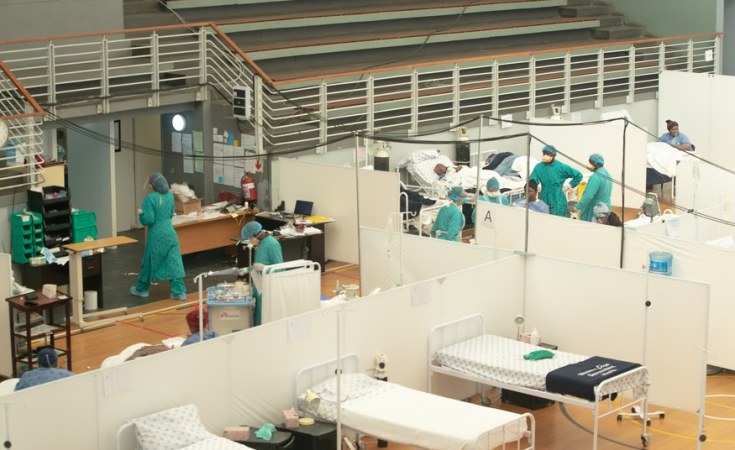The economic and health costs to Africa of the Covid-19 pandemic are unprecedented by any measure. With the death toll rising above 50,000 and more than two million confirmed infections so far, the continent has many reasons to be worried.
So far, Covid-19 lockdowns have triggered the first continent-wide recession in 25 years, costing Africa an estimated U.S. $115 billion in lost output and pushing up to 40 million additional people into extreme poverty, according to the World Bank.
Even before the coronavirus struck, Africa was in trouble, with most countries struggling to repay an accumulated $547 billion in debt owed to other countries, multilateral banks and private lenders. Now we face a cash crunch: national treasuries do not have money to cover the costs of dealing with the pandemic, worsening our socio-economic challenges. The resulting high private out-of-pocket expenditure has pushed many people into poverty. While richer countries have been able to deploy more than $11 trillion to cushion themselves from the impact of Covid-19, African nations are badly in need of resources to provide a robust response and recovery.
To recover from the economic damage, the International Monetary Fund (IMF) estimates that African governments face a financing gap between now and the end of 2023 of about $345 billion – the amount that would be needed to cover emergency stimulus packages to jump-start economies, to strengthen national health care systems and to set up social safety nets to cushion vulnerable communities. Such funding could also finance the "liquidity and sustainability facility" which the UN Economic Commission for Africa has proposed to lower borrowing costs by ensuring that short-term commercial debt obligations can be met and to provide extra liquidity for the private sector.
The lack of fiscal space by African countries to tackle the pandemic and its aftermath can be attributed to four challenges, according to the IMF:
First, the high debt-to-GDP levels, which the IMF considers unsustainable, since countries are near or at distressed levels while still borrowing without evaluating exchange rate risks and the real costs of repaying the debts;
Second, the huge gaps between spending and revenue mean that African countries are forced to explore alternative financing for development projects. Consequently, loans become a recourse, further exacerbating the debt burden;
Third, the high cost of borrowing, with crippling interest rates between five and 16 percent on 10-year government bonds, compared to near-zero to negative rates in Europe and America. For sub-Saharan African economies, interest repayments constitute the highest and fastest growing portion of expenditure.
Lastly, the depreciation of many African currencies against major international currencies has triggered inflationary pressures. For example, the Botswana Pula and the South African Rand have lost about 8 percent of their value against the U.S. dollar since the outbreak of the pandemic.
Africa's debt burden is stifling the growth of economies and stagnating the very health care systems necessary to maintain healthy and productive populations. While a number of governments have increased the proportion of total public expenditure allocated to health, African countries spend up to five times their health budgets on debt repayments. Overall, inadequate health financing remains a major constraint to effective health service delivery.
Over the next year alone, the continent is expected to fork out almost $55 billion to service public debt. If these debt repayments could be put on hold, governments could divert the funds to meet rising health care demands and support vulnerable businesses and communities.
The response to Africa's plight by creditors has so far been lukewarm. G20 countries have responded to the crisis with a temporary suspension of $5 billion in debt service payments, which is about 40 percent of what Africa was spending on the health sector before the pandemic. Aside from bilateral lenders, multilateral institutions and private financiers – including international bonds and commercial banks – are non-committal about delaying some $24 billion that is due to be repaid by African countries over the next year.
African countries should not be forced to choose between meeting debt payments and responding to Covid-19's health and economic emergencies. For this reason, the African Union (AU) should take the lead in monitoring how vulnerable countries are to rising debt.
The following steps need to be taken to address the coronavirus-generated crisis:
- The AU can rally member states to pressure G20 countries, multilaterals and commercial lenders to suspend debt repayments until the end of 2021.
- Rich nations should further be encouraged to voluntarily transfer part or all of their special drawing rights to boost foreign exchange liquidity and ease pressure on central banks in poorer countries.
- At the same time, national treasuries should borrow for productive expenditure and manage the proceeds of international bonds more prudently and with integrity and transparency. The Conference of Speakers and Heads of African Parliaments (CoSAP) could serve as a mechanism to hold African leaders accountable. CoSAP has committed itself to ensure transparent and effective utilization of resources from debt relief.
- African governments must also tackle corruption and establish transparency and accountability mechanisms that ensure freed-up resources are properly invested in social, economic and human capital development.
Amadou Mahtar Ba is a member of the Africa Policy Advisory Board of ONE, the global movement which campaigns to end extreme poverty and preventable disease by 2030. He is also a co-founder and the Executive Chairman of AllAfrica Global Media Inc., which owns and operates allAfrica.com .


